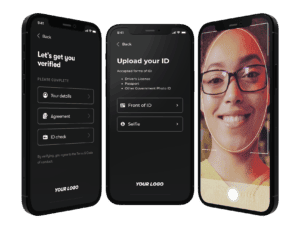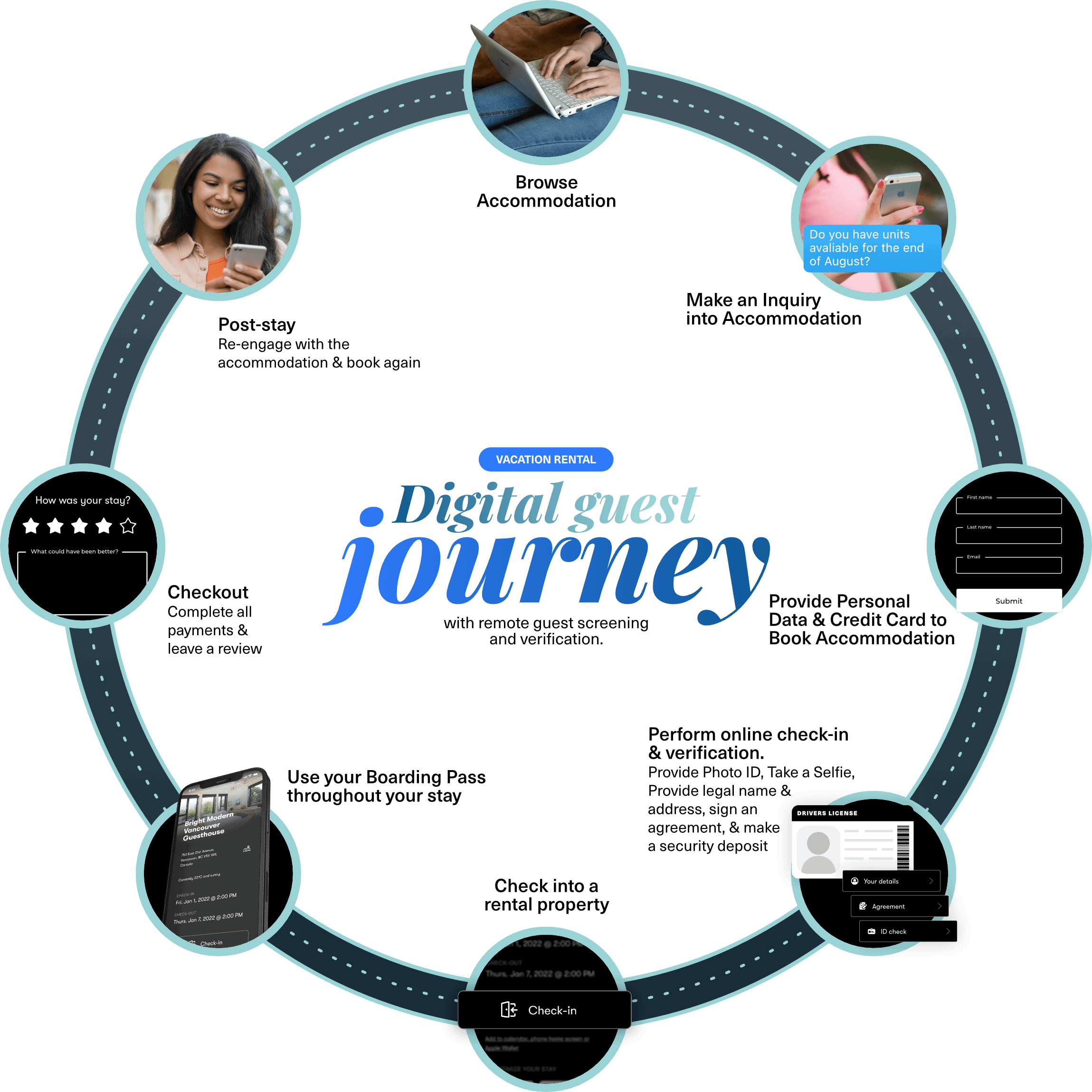Guest screening and guest identity verification are common practices for hotels and enterprise hospitality businesses. The rapidly growing and professionalizing short-term rental sector is catching up, adopting the concept of building trust and security.
Online travel agencies, such as Airbnb and Vrbo provide occasional guest [and host] verification options, however there is no fixed policy on this. On the OTAs’ side Airbnb is known for its added layer of protection with an optional ID verification feature. In fact, Airbnb introduced the ID certification procedure already in 2013, shaping the trust and safety standards in the sector.
Privacy and anonymity of short stays may attract violators, that’s why the industry takes the trust and security seriously. On the other hand, cumbersome security procedures are an obstacle on the way to a positive guest experience and repeat bookings.
In this article we will dive into what guest verification looks like for a professional property manager. We’ll explore procedures and tools used in vacation rentals to strike the delicate balance between hospitality and security.
Why do we need to screen guests? The importance of guest verification in vacation rentals and boutique hotels.
When renting out a family house or managing multiple rental properties, you definitely want to know who is walking through the door. The need to trust internet strangers staying at your premises can cause anxiety.
Protecting the business, properties and community from risks associated with bad guests is mainly why hospitality companies screen guests. Let’s see what these risks are and how to eliminate them with guest screening:
1. Prevent property damage
Property damage can vary from broken glassware to cracked TV screens and even completely burnt homes. While it is hard to predict people’s behavior, you can significantly reduce the risk of vacation gone wrong by only allowing in the people who comply with your requirements.
For example:
- Filter out guests who have a history of causing damage or any previously reported “bad guest behavior”
- Double check red flags such as young people renting out a space close to their home. Last minute staycations increase the risks of unwanted parties.
While you don’t want to deny people because of their age and/or being locals there are tools that add an extra layer of protection like government issued ID verification, “black lists” database checks, background checks, etc. to filter the bad guests from the good ones.
2. Prevent parties
Wild parties are harmful for rental properties, and the community around them – they have become a big issue, especially during the pandemic.
Airbnb retaliated, by completely banning parties and even cooperating with other booking platforms to filter out harmful merry-makers. The ban also included not allowing guests under 25 without review to book houses locally, creating caps on occupancy. Airbnb also launched a 24/7 support line for neighbor complaints.
Professional Operators do not want parties in their properties. Despite the prevention measures on Airbnb to limit bad guest behaviors, and the overall ban on parties, guests can still trick the system. Furthermore, while Airbnb may have more strict policies than other booking channels, not every OTA has preventative measures for party goers. This is why guest ID verification and checks are important – after all, hotels always do it.
3. Avoid noise violations
Noise violations, together with lack of parking space and garbage misconducts, are one of the most common neighbor complaints. This problem can hurt your business and negatively affect the industry’s reputation.
There are ways to stop vacation rental noise complaints even before they happen. The first approach is to screen guests coming into the rental property. Noise violators, similar to house party offenders, are not considerate of the rental home, its owners, neighbors and the local community.
How to know which people are unlikely to make excessive noise while screening guests?
This is where a vacation rental history reviews check, and guest data come into play. Knowing how many people are staying at your home, and who they are, is important. You can also ensure a cap on occupancy to further reduce the risk of parties.
Together with identity verification, clearly communicated house rules, rental agreements and history check, the chance of misbehavior is continuously decreasing.
4. Avoid fraud
Organizations lose 5% of revenue to fraud each year, according to the 2022 Report to the Nations on Occupational Fraud and Abuse. The median loss for the food service and hospitality industry is estimated at $55,000 in 2022.
With most transactions being carried out online, hospitality operators are at risk of being targeted by scammers more than ever before. Being able to verify identity, confirm validity of documents, and check history, can detect and prevent fraud from happening. Let’s review a couple of instances of “popular” guest fraud cases that happen in vacation rentals and boutique hotels.
Fraudulent bookings and identity theft
Fraudulent bookings are performed by scammers whose inquiries are made without the intention to actually stay in a rental property. They aim to access personal information, sometimes duplicating keys to steal money or valuables from hosts or other guests.
When “prospects” request information, not provided in your booking procedure or send links, this might be a sign of identity phishing. This can be an attempt to steal your or your guests’ personal information in order to commit crimes in your names. Here are Vrbo’s tips on recognizing a booking inquiry scam.
To prevent fraudulent activity and identity theft property operators should take a higher precaution when approving reservations. In addition to having correct policies and measures in place, guest verification plays a critical role in mitigating these risks.
Chargeback fraud
Chargeback fraud is defined by Wikipedia as friendly fraud. In the hospitality industry it occurs when guests, after staying at accommodation, call their bank saying that they don’t recognize the charge. The issuing bank will run an investigation, but will most likely side with their client, the guest, reimbursing the guest for a stay that did in fact happen
Having guests’ details, signed documents, data about their stay such as check-in times, check-out times, IDs, and any trace of their stay in the property helps fight those fraudulent chargebacks. If the business is using smart locks, logs from the devices can serve as proof of the guests staying in a rental.
The process of collecting this information can unfortunately be tedious, but there are solutions out there! Learn more about Enso Connect’s verification process with the Boarding Pass.
5. Prevent criminal activity in the property
Loaded guns, kidnapping, human trafficking, rape, murder and even terror attacks – nightmares that unfortunately can happen in rental accommodations. In a horrifying article from 2021, Bloomberg says that Airbnb spent an average of about $50 million annually on payouts to hosts and guests, including on legal settlements and damage to homes.
What are the chances of crime happening in your rental? Bloomberg’s article mentions that Airbnb says that fewer than 0.1% of stays result in a reported safety issue, but with more than 200 million bookings a year, that’s still 200,000 trips with serious criminal activities occurring. Do keep in mind, this is just Airbnb, and are for cases that have been caught.
Guest identity verification, background and history checks help mitigate risks of criminal activity.
Now the important question is, how do you actually set up the right systems to mitigate such risks?
How do we verify guests and what does ‘guest screening’ and ‘guest verification’ actually mean?
Guest screening in hospitality is a process of examining and assessing the risks related to booking a rental property by a specific person or group. There are certain guest data points that can be flagged as higher risk for specific reservations that require a more thorough check.
The most common rental property booking red flags that draw attention during manual or automated screening are:
- one night stays
- last minute bookings
- local travelers under 25 years of age
- no credit cards associated to the reservation or ID check
This doesn’t always mean that flagged bookings need to be declined, however they require a closer look and further checks. As part of an automated screening process, these cases proceed to the next security level, to additional questions and information requests, rules reiteration, identity verification, etc.
The term guest screening became more widespread during the pandemic. When hospitality providers, as any other businesses, had to screen their guests to ensure compliance with Covid-19 regulations.
There are also cases that require an immediate decline or cancellation, a community update and sometimes a report to the authorities.
The signs of high risk requiring immediate booking terminations are:
- credit cards that don’t go through and are indicated as stolen
- phone numbers revealed as a burner phones
- fake IDs or identity theft
To “catch” “bad guests” there is a need for proper data-driven guest verification. It’s a process of validating information provided by potential customers and confirming that they are who they say they are.
When do we verify guests? How guest screening and verification works for property managers.
The answer is: always. All property managers and owners understandably want to know who is walking through their door and ensure safety in their property. Hence every hospitality business has some kind of a screening and verification process in place. From manual screening, based on guest profiles, to identity verification and background checks with automated systems.
In recent years the professionalizing short-term rental industry has developed a certain standard of security procedures. Property managers keep the procedures along these lines, depending on the unique needs of every vacation rental business.
Steps of the online guest verification process

1.
Personal information collection, such as name, date of birth, home address, mobile phone number, email address and a copy of a government issued ID
2.
Processing the info, verifying the details to match those in the ID, identifying fake or stolen documents, registration of the phone number and email.
3.
Collecting guests selfie or a short video for a biometric check
4.
Matching the guest’s selfie or video with the photo on the provided ID to confirm that the document belongs to the guest.
5.
In some cases background checks, scans through criminal databases and blacklists, authority reports and credit card verification can be performed as an extra layer of security.
How does it work for guests? Screening and verification as part of the vacation rental customer journey
Hospitality professionals want to avoid bad customers but have enough on their plate to do manual screenings. It adds up to all the other elements of the guest journey they need to work on. This is where guest screening and verification technology comes into play. It helps limit operational burden, reduce manual labor, and avoid human error. However, it can be tricky to balance trust and security procedures with a warm and welcoming guest experience.
Including identity verification into the guest journey can be a cumbersome task for property managers and hoteliers, as well as an annoying routine for guests. So when is the best time to request information and make the necessary checks in order to understand who is going through your door?
Let’s explore where remote screening methods can be built into the digital guest journey without disrupting the guest experience.

Guest screening during the booking process
Everything starts with communication. To start, leverage the inquiry stage of the booking process to understand who your guests are. Understand the purpose of the trip, how many people will be staying, and what they may require for a great stay. You can collect the needed security information that will help you personalize the guest experience.
Airbnb allows hosts to filter and accept only ID verified guests. However, verification is not mandatory for all guests. Some OTAs, like Booking.com, don’t provide an option to screen guests before they book at all. This is why relying only on booking engines to make trust and safety decisions is not recommended.
With last-minute instant bookings it’s even harder to make the needed checks in order to understand who is coming through the door. Keep in mind, an OTA’s objective is to increase bookings flowing through the platform while mitigating risks for guests and hosts. But the risk tolerance an OTA has for hosts may be different from your own risk tolerance, or that of your owners.
At the booking confirmation process, you can request additional information and inform the guest that this is part of the confirmation process.
Enso Tip: It is recommended to go through the checks before the check-in process to avoid any confusion or frustrations along the guest journey.
Guest verification before check-in
Online check-in is another great opportunity to verify guests before you let them into the property. If the booking process facilitates setting expectations, confirming details and validating information, digital check-in allows digging deeper into the case.
It makes sense to request personal information, an agreement signature and a security deposit before the actual check-in. When done in a polite, efficient and non-intrusive way, these security steps shouldn’t cause guests any inconvenience.
How long does it take to verify guests?
Guest screening and verification used to be a manual process – requiring time and effort to perform comprehensive checks of potential guests.
With the digital transformation of the hospitality industry, there are more and more automated AI-powered solutions that make property managers’ lives easier. This also includes guest screening and verification technologies.
The difference between a manual and an automated processes:
1.
First, the AI and automation way eliminates discrimination when verifying guests.
2.
Second, it saves time for you and your team. The manual guest verification process involves a lot of back and forth communication: collecting information, IDs, signatures, deposits, etc.
If verification requires switching softwares, downloading apps and contacting third-parties, your guests will question the experience.
The key to success in professionally managed short-term rentals is finding the balance between hospitality and technology.
Employ technology to secure your property, provide hotel-like services while streamlining the digital experience of your accommodation.
Learn more about Enso Connect’s guest experience system, and our security partnerships.
Vacation rentals can learn about blending security and quality guest experience from hoteliers. Hotels have the convenience of a physical front desk, where trained staff collect the necessary information to validate check-ins and reservations. Growing guest expectations require property managers to provide that same hotel-like front desk service, but with disparate inventory. With the current labor shortage in hospitality, the only profitable solution is employing technology.
Do OTAs screen guests and how do they do the verification?
Many short-term rentals and boutique hotels heavily rely on online travel agencies for marketing and distribution. They also use the safety mechanisms embedded in such systems.
Is the guest screening and verification process of OTAs good enough for the safety needs of hospitality businesses? Do operators, listing their properties on popular booking platforms, need to double down on guest vetting with other solutions?
It depends on the platforms and the needs of every business. Let’s review what the most popular OTAs have to offer in the trust and security space:
Airbnb guest screening and verification
The most commonly used online travel agency is without a doubt, Airbnb. It has been leading and shaping the short-term rental industry since its inception. Airbnb is known for constantly improving its guest screening and verification process. However, it’s still a topic of discussion and concern among the platform users, both guests and hosts.
The information is not shared with anyone on the platform. Guests can only see:
- The first name on the ID
- Whether the person is over or under 25 years old
- Whether the person’s ID has been successfully added
- The person’s profile photo and profile name
- The verification process may take up to 24 hours, but sometimes will be approved within a few hours.
Airbnb encourages guests and hosts to get verified by submitting government issued IDs to confirm real names and addresses. The requirements might be to provide:
- photo of a government-issued ID
- a new photo of the person
- legal name
- address (match with banking documents or utility bills).
The platform might request guests to get verified in order to be able to book rentals or experiences, but it doesn’t cover 100% of the users.
Hosts can choose to only accept verified guests to prevent risky bookings. However Airbnb does not guarantee anyone’s identity and doesn’t assure that interacting with them will be safe. The platform encourages hosts and guests to always use their own best judgment, and follow safety tips.
Airbnb uses machine learning as part of its verification process to prevent fraud and other problems before they happen. Its real-time detection system scans multiple data points to detect suspicious activity. The suspicious guest account is then checked more thoroughly or taken down entirely.
Airbnb also has a security department that deals with the consequences of misconducts that have already happened. They support the victims, investigate cases and arrange settlements.
VRBO guest screening and verification
There’s no way for a property owner or manager to require a guest to confirm their identity before sending a booking request on Vrbo.
Vrbo encourages guests to get a “Verified Identity” badge by confirming the following information:
- Physical address
- Date of birth
- Other personal information
But this is not mandatory to be able to make bookings on the platform, and does not appear as sufficient to differentiate bad actors from good ones.
Vrbo verification doesn’t always require a photo ID, like driver’s license or passport, or physical proof of address, opening operators to risks. There is also no way to verify that the ID used during the verification process is not fake or stolen.
Vrbo allows third-party vendors to verify identity via more detailed background checks but they don’t require this level of verification to confirm a booking.
Vrbo only requires users to provide identification in some countries where it is legally mandatory, such as in Spain, Italy, and Portugal. These countries require vacation rental site owners to share the ID of each person staying with the local authorities 24 hours after arrival.
Booking.com guest screening and verification
Booking.com describes their security measures on the partner website:
Background checks
We make sure guests are screened against numerous global sanctions watchlists so our partners aren’t at risk when hosting.
Fraud scoring
We use machine learning models to detect fraud when guests are booking and take measures to protect your reservations.
Reservation risk
Even after the guest books, we still run additional checks and take action against bookings we know will be canceled.
Guest blocking
We have multiple teams working to prevent problematic guests from booking properties on Booking.com.
Effective guest screening practices
There are more common practices helping you understand who your guests are. Adopting these practices in your security process will prevent bad actors from coming through your door.
1. Guest details collection
When you have people’s personal details: legal name, address, ID, etc., it is easier to keep them accountable during their stay at your property.
Collecting such information as reason for stay helps understand and estimate risk for a specific reservation.
Collecting guests data will benefit your business beyond the security needs. You will better serve your guests with personalized interactions, earn more money with tailored upsells and win return bookings with targeted marketing.
2. Payment validation
With the ease of online transactions and the rise of credit card fraud in hospitality it is important to know whether a guest has enough balance to cover their booking. Validate payments to prevent chargebacks and automatically process security deposits.
3. House rules clarification
Having clear vacation rental house rules is the key to a smooth guest management process. Prevent misunderstandings and problems before they even have a chance to happen with a comprehensive house manual.
Among the most crucial house rules are:
- No smoking
- Parties are not allowed
- Pets are not allowed or if allowed, a specific fee associated to the number of pets
- Garbage disposal rules, etc.
Property managers always need to clarify that guests are aware and agree to these rules.
4. Rental agreement signature
To make sure guests will be well behaved at your property, it makes sense to ensure guests acknowledge and agree to your house rules. The best way to do this is via a legally-binding usage agreement.
This document shouldn’t be complicated, listing clearly what to do and not to do in the property.
5. Flagging suspicious data points and behavior
You can flag suspicious reservations manually based on your own research and gut feeling or red flags you see.
Common reasons why bookings are flagged include:
- A booking of a large capacity home with 1 or 2 guests listed on the reservation
- A long stay at a property during an off season
- Local guests under 25 years of age
- One night or a last-minute booking
- A payment that has been declined several times
- Credit card payments with a name that is different from the name on the reservation
It is important to remember that legitimate guests can also trigger these concerns accidentally. It could just be someone who made an honest mistake or doesn’t have an intention to party in a rental property but appears as a flagged guest nonetheless. These are not the primary reasons to decline or cancel bookings but are cases that require immediate attention and additional checks.
Not all guests require the same level of screening. This is why automating this process and defining the flagged cases that can cause real harm will save you time and money. It also prevents legitimate bookings from being flagged by human error.
6. In-stay monitoring (with smart home devices)
Using smart home devices such as smoke and noise monitors provides the property manager with full control of the guests’ good behavior.
Just knowing that these devices are installed in the property already helps you keep the guests accountable and aware of their actions.
Knowing what is going on in your property, while remaining privacy conscious, and being able to communicate with guests in real time can prevent problems from happening.
What are ‘bad’ or ‘risky’ reservations and what to do when you catch them?
What does a ‘risky’ reservation mean?
A risky reservation is “a reservation that displays characteristics that could threaten a property manager, their business, or the community”, defines Rentals Scaleup in the article about the rise of risky reservations in short-term rentals.
This can range from the risk of organizing an unsanctioned gathering to signs of criminal activity being planned to be made in the property.
How to protect your property when screening found a “risky” reservation?
Collect security deposits
What is a security deposit
According to the Investopedia’s description, a security deposit is money that is given to a landlord, lender, or seller of a home or apartment as proof of intent to move in and care for the domicile.
A security deposit is intended as a measure of security for the recipient, and can also be used to pay for damages or lost property.
Security deposits serve as an intangible measure of security, or as a means of tangible security in the event of damages or lost property.
How much should a security deposit be for a vacation rental?
Security deposits can be fixed and percentage based. A standard refundable damage deposit for the short-term rental industry is between $250 and $500. Luxury properties charge up to $2,000 and more.
Percentage-based security deposits percentages of the reservation’s total price and can vary between 10-20%.
Fixed-rated security deposits are more popular for simplicity.
How to collect a security deposit?
- Cash
- Check
- Bank transfer
- Credit card preauthorization
- Charge and refund
Collect damage waiver fees
What is damage waiver in vacation rentals?
Similar to the automotive industry, damage waiver in vacation rentals is an optional product that waives guest’s financial responsibility for any loss or damage incurred to the rental property, provided you have not violated the Rental Agreement’s Terms and Conditions.
How much should a damage waiver be for a vacation rental?
It usually varies between $20 and $200 depending on the property.
How to collect damage waiver?
- Cash
- Check
- Bank transfer
- Credit card
Security deposit VS damage waiver – what works best for vacation rentals?
While the damage waiver can be a wise choice for vacation rental guests, traveling with kids or pets for example, some travelers might find this non-refundable fee unsatisfactory. It depends on the guest’s preferences and potential risks for causing damage to the rental property.
For vacation rental hosts, a non-refundable damage waiver can be an additional source of income, allowing you to effectively build your own internal insurance policy. If your guests screening is good enough, the chances of damage are pretty low, leaving you at the end of the guests’ stay with an extra $20-$200 in hand.
Accumulating damage waivers, means you will always have additional revenue that you can leverage for fixing any issues with the rental property caused by guests.
Ways to implement vacation rental guest screening and verification
Manual guest screening and verification in vacation rentals
Talking about a high quality manual guest screening, we would think of a team of trained agents, doing the following:
- reaching out to guests, confirming their personal and contact information
- clarifying guests’ travel details and the purpose of their trip
- having the guests to acknowledge and agree to the house rules, as well as make them sign an rental agreement
- collect and validate guest identification documents, looking them up for fraud
- collect security deposit or damage waiver
While employing a security team would filter out most of the bad actors before they even try to perform any harmful activity, this is a very costly solution. This is also not scalable when you grow your hospitality business by significantly increasing the number of listings and guests coming through your doors.
There is always a place for human judgment, and property managers or owners should always have the last word on approving booking. However, most of the guest screening and verification process can and should be automated.
With the digital transformation that is happening in the hospitality industry in recent years, there is a plethora of professional trust and security service providers, making the process seamless for operators and their guests.
Guest screening and verification through your PMS (Property Management Software)
There are property management systems that have a guest verification solution as a built-in feature. For example, having a check-in form sent to the guests with an option to upload a photo of ID, or providing a rental agreement with e-signature.
Other property management systems don’t focus their tech effort on guest screening and verification, leaving it to the security experts integrated with them. Such PMS companies usually would have a couple of different trust and security vendor integrations in their marketplaces, letting users choose what works best for their business.
Guest screening and verification through third-party experts
Autohost
Autohost is a guest identity verification and fraud detection platform for fast-growing hospitality companies. Using machine learning and behavioral checks, Autohost creates a scalable process to review your guests and keep your properties safe.
Autohost automates ID verifications, credit and background checks, security deposits and more. We help you reduce your insurance premiums, mitigate risk and eliminate chargebacks.
SUPERHOG
SUPERHOG combines intelligent guest screening (Know Your Guest™) with automatic damage protection. It is a SaaS solution for the vacation rental industry that integrates seamlessly with your booking journey. With SUPERHOG, you can be confident that your guests are who they say they are and rest easy knowing your properties are safe.
SUPERHOG enables a growing ecosystem of hosts, operators and guests to make their online activity safer. It provides a tech-based AI-supported toolkit including biometric recognition, ID verification, Know Your Guest™ checks, automated deposit and damage waiver collection. SUPERHOG offers an insurance-backed guarantee that provides protection in relation to property damage caused by guests up to $5,000,000.
Partee [for vacation rentals in Spain]
Partee helps speed up the registration of vacation rental guests, automating the entry reports of travelers, which must be sent to the corresponding police force. It is a cloud service, accessible with most mobile devices.
It is mandatory by the law in Spain to register all travelers over 14 years of age. Guests need to complete a form known as traveler’s part (parte de Entrada). They need to transmit the data to the police in less than 24 hours after check-in.
How much does it cost to verify guests in vacation rental property?
Depending on the needs of a vacation rental management business, the security level and the cost of guest screening and verification will differ.
As reviewed before, online travel agencies are doing basic checks and verifications. Airbnb users trust the platform with most of the reservations. Usually bookings coming through Airbnb require less attention and additional verifications or checks than other booking channels.
So depending on the booking channel the business uses, guest verification costs can vary from $0 to up to $10 per reservation.
Benefits and pitfalls of guest verification in short-term rentals
How guest screening and verification affects guest experience
Protecting properties from ill-doing guests, fraud and criminal activity is crucial for short-term rental businesses. There is no doubt that adding trust and safety to the equation is beneficial.
Cumbersome security process leaves guests with a bad experience
Over-screening guests can be an obstacle for a positive guest experience. Fragmented, intrusive and overwhelming security processes is everything but a positive experience. Making your guests scramble between different links, emails, messages and calls can lead to bad reviews and even booking cancellations.
Guests like to skip lines and wait times with contactless digital screening
Streamlined digital screening and verification process not only secures the business, but also shows that you are a professional business, taking safety seriously. It also frees up your time so you can focus on meaningful interactions with your guests.
Travelers, used to one-click checkouts on Amazon and instant rides with Uber, will appreciate the same digital experience in their accommodation.
How guest screening and verification affects vacation rental revenue
High cost, low scalability and missed opportunities of manual verification process
If performed manually, guest screening and verification can be a heavy lift for your team. It’s a tedious, labor-heavy and costly process.
Automated guest screening unlocks new revenue streams in short-term rentals
Automated contactless guest screening and verification saves time and money while providing the same level of security as employing human agents.
Having the technology by your side unlocks additional revenue streams that weren’t available due to bans of entire categories of guests. For example, a one-night last minute booking can be for a couple of responsible locals not wanting to drive after a boozy dinner. Being able to quickly verify last-minute guests and convert them into bookings increases your bottom line without compromising safety.
Conclusion
Renting out properties to strangers in the era of digital-first interactions is risky. Scammers are constantly getting better and more creative, having more tools in their arsenal to negatively affect your business. Luckily the hospitality industry is progressing and technologically transforming its processes to catch up with such threats.
Professional property managers have various security options available to protect and streamline their businesses. These tools, seamlessly instilled in digital guest journeys, significantly improve guest the experience, all while maximizing safety and security of your assets.
How do you keep your vacation rental business secure? How do you find balance between such needed trust and safety procedures and making your guests feel welcome in your properties?








One Comment